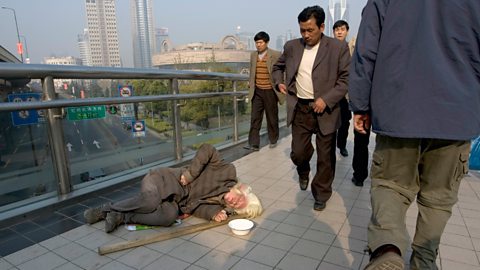Climax and anti-climax
This is the building and release of tension in drama.
Tension is a growing sense of expectation within the drama, a feeling that the story is building up towards something exciting happening. Without tension in a scene it is hard to keep the audience engaged with what is happening so the work may be flat and dull.
A climax is when the tension within a scene builds to its highest point. ItÔÇÖs the most exciting moment. An anti-climax is the release of tension. It happens after the tension has reached its highest point and then suddenly drops.
Imagine a scene where a hostage has escaped their captors. They realise what has happened and search the room where the hostage is hiding. Pauses build the tension and the hostage is very close to being caught so the audience are on the edge of their seats. When the hostage is seconds away from having their hiding place discovered, the captors decide to leave and search somewhere else. The audience breathe a collective sigh of relief for the hostage.
This is an anti-climax. The tension has built and has been released. Serial dramas and television soap operas such as EastEnders often finish just before or at the point of climax so that the audience will tune in again to see what happens next. This is called a cliffhanger or the ÔÇÿduff duffÔÇÖ moment on account of the music at the end of each episode!
Contrast
Contrast is a marked difference between two or more things placed side by side for dramatic effect, eg stillness next to activity. When two opposing things are placed next to each other their impact is strengthened. You could use contrast as a way of highlighting differences in your drama and keeping the audience interested.
For example, a woman is lonely and miserable after the death of her beloved husband. Creating a flashbackA scene enacting something that happened in the past; the enactment of a character's memory of a past event. memory of their joyous times together, laughing, and playing with their children contrasts with the present and makes her loss more intense and moving for the audience. They fully understand what sheÔÇÖs lost.

What contrast is being demonstrated by this image? Not only is there a contrast in the physical levels of the people in the image (one is lying down and the others are upright), there is also a clear contrast in their situations. The man lying down is homeless and jobless whilst the other characters look like fairly prosperous people on their way to work. You can use such an image as a springboard or stimulus to creating a scene using a similar contrast between characters.
Cross-cutting (moving from one scene to another and back again) is also an effective way of exploring contrast in any drama you devise, especially if you are exploring a theme or issue.